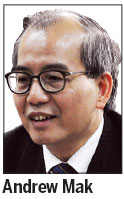Lack of patent validity mechanism will attract public attention
Updated: 2013-08-14 06:03
By Andrew Mak(HK Edition)
|
|||||||||
In Hong Kong, more than 24,000 men and women are diagnosed with cancer each year. One can imagine how this kind of news plunges thousands of individuals and families into a state of turmoil. It will not be an exaggeration to say that their world is turned upside down.
In an interesting piece of news last week, the Hospital Authority (HA) was urged to include a new drug to treat advanced breast cancer on its subsidized list. The Society of Hospital Pharmacists said the drug, everolimus, is a newly available option for patients and hopes public hospitals will soon prescribe it.
Everolimus may not attract much attention amongst the general public. It is used to treat HER2-negative, hormone-receptor-positive advanced breast cancer for a particular group of postmenopausal women. The drug was approved by the Department of Health in March for sale in all Hong Kong hospitals to treat breast cancer. However, everolimus has not been listed in the HA Drug Formulary. This is so despite the fact that the US Food and Drug Administration approved everolimus tablets in July last year.
The delay of inclusion, or indeed the absence of effective anti-cancer drugs in the HA Drug Formulary, compared to the expensive costs in the private market, is cause for concern.

Take a recent example in India. The country took the decision to revoke patent on global drug manufacturer GlaxoSmithKline's anti-cancer drug Tykerb, in its salt form. The decision followed a landmark India court ruling disallowing patents for incremental innovations that was a blow to global pharmaceutical firms.
At the same time, India's Intellectual Property Appellate Board also upheld a patent granted on the original compound lapatinib. The active ingredient was considered to be of innovative merit. The impact of such news is that the medicine remains subject to patent protection until 2019. The additional patent on the particular salt of lapatinib used in Tykerb, which has now been revoked, would have extended that protection to 2021.
India is not particularly known for its efficiency in the rule of law. Cases drag on for years. However, it seems this one aspect attracts particular attention in Indian politics. The control of such monopolies has been common in India. Last year, India revoked patents granted to other big manufacturers such as Pfizer Inc's cancer drug Sutent, Roche Holding AG's hepatitis C drug Pegasys, and Merck & Co's asthma treatment aerosol suspension formulation. All those patents were revoked on grounds that included a lack of innovation.
In Hong Kong, challenges to the validity of patents are few and far between. A search of the Internet shows that a more modest approach is in place. There appears to be a cancer relief fund that benefits some 200 cancer patients a year under a new HK$42 million pilot scheme to subsidize expensive drugs.
The same pharmaceutical giant GlaxoSmithKline will contribute HK$25 million to the fund. The fund will subsidize two types of drugs, one being topotecan for cervical, ovarian and small-cell lung cancer, and the other lapatinib for breast cancer.
Compared with the number of new patients, it seems that while drug manufacturers are conscious of the threat of new measures in other countries such as India spreading to places like Hong Kong, and efforts are made to reduce accusations of expensive anti-cancer drugs, the lack of a strong patent-adjudication system on the validity of patents will soon attract public attention. The HA has come under pressure to provide anti-cancer drugs at lower cost and hence its list of anti-cancer drugs may be considered relatively limited. More effective drugs at reasonable costs are certainly in demand and of benefit to our society.
The Intellectual Property Department, in pursuing a policy that Hong Kong may develop into an intellectual hub, may also wish to consider advising the Chief Executive as an important priority, that the government should consider seriously the establishment of machinery to deal with such lack of a patent validity-adjudication system, instead of just confining the Hong Kong system to mere registration.
The author is a Hong Kong barrister and chairman of the Hong Kong Bar's Special Committee on Planning and Policy.
(HK Edition 08/14/2013 page9)